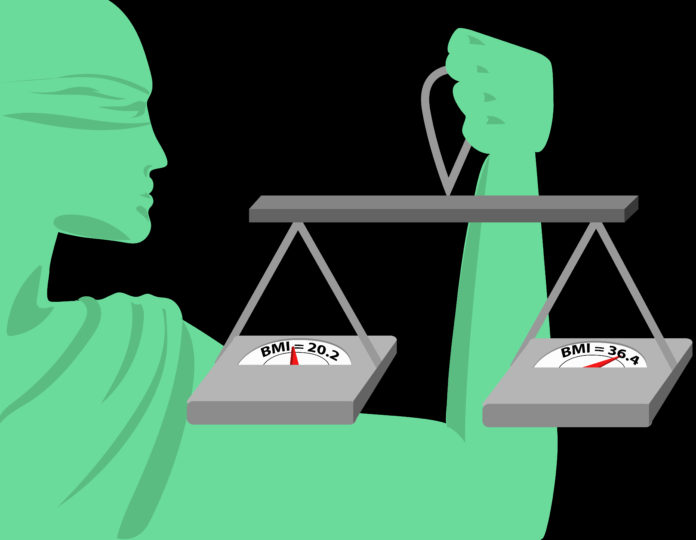Hashtags like #MeToo and #BlackLivesMatter have been used to call out injustices against marginalized groups. Less discussed, however, is the discrimination overweight people face.
In the past decade, the prevalence of weight discrimination in the U.S. has increased to reach rates comparable to that of racial discrimination, according to the American Journal of Public Health.
While federal law prohibits workplace mistreatment on the basis of race, age, gender or religion, only one of the 50 states, Michigan, has any legal protections against weight-based discrimination.
Weight stigmas may have remained socially acceptable because it has been suggested as a method for obesity control. The idea that shame is a productive means for enforcing an individual’s lifestyle change is grossly patronizing. These attitudes toward obese people perpetuate victim-blaming, viewing their health condition as a result of their own laziness or lack of self-discipline.
We should recognize the biases on obesity within ourselves, our peers and our workplaces, and call them out for what they are: an injustice just as unfair as any other form of discrimination.
One in three American adults are obese, according to the most recent data collected by the Centers for Disease Control and Prevention. Individuals with a body mass index above 30 are considered obese. With such a large portion of our population fitting into this category, it is imperative that we create a system that does not disadvantage this demographic.
Studies show weight discrimination affects the employment opportunities, access to health care and the psychological wellbeing of overweight people.
This issue disproportionately affects women and should be considered part of the feminist movement. Obese women were found to be nearly three times more likely than obese men to report discrimination in a 2016 study. The heightened social expectation for women to fit conventional molds of beauty makes them increasingly vulnerable to weight-based prejudice.
The same study found that obesity is also stereotypically linked to characteristics such as being “less physically capable and slothfulness.” A 2009 survey of two thousand employers reported 93 percent of workplaces would choose a non-obese applicant over an equally-qualified obese applicant.
Title VII of the Civil Rights Act prohibits employers from discriminating on the basis of sex, race, color, national origin or religion. This legislation was passed in 1964. Fifty-five years later, there are still no provisions protecting the third of the U.S. population vulnerable to weight-based discrimination.
Obese workers often receive less health benefits from their employers as well. Many workplaces require that employees meet weight-related wellness goals to qualify for health benefits. The National Bureau of Economic Research found that obese workers have lower wages unrelated to their productivity. The feminist movement is also working on pay equity, with women earning roughly 77.9 cents for every dollar earned by men. While women have the foundation of the Equal Pay Act of 1963 to campaign from, obese people have no such legal precedent.
Even within health service institutions themselves, obese patients find themselves prejudiced against. Research by the American Journal of Public Health indicates that medical providers spend less time in appointments and effort in health education with obese patients. The same study also reported that obese patients “perceive that they will not be taken seriously because of their weight, report that their weight is blamed for all of their medical problems and are reluctant to address their weight concerns with providers.”
Some may be reluctant to support obese acceptance, mistaking it for the promotion of obesity itself. However, advocating for equal rights of all people should always take moral priority over maintaining prejudice. Lifestyle change does not occur through stigmatization, but through loving acceptance.
A 2018 study found that “weight stigma can trigger physiological and behavioral changes linked to poor metabolic health and increased weight gain.” Obesity, the official journal of The Obesity Society, estimates that people who have faced weight discrimination are 2.5 times more likely to experience mood or anxiety disorders, even when accounting for health influences. Evidence shows that social judgement does nothing but psychologically harm obese populations.
If we refuse to embrace obese people into the programs, activities or resources that could help them, how could we possibly expect them to feel comfortable and welcome? And how could we ever call ourselves a progressive society if we would rather hold onto our prejudices rather than treat people as fellow human beings?
We have come to a time in history where we have legally acknowledged that women and people of color deserve the same rights as everyone else. It is time we do the same for our overweight people as well.






